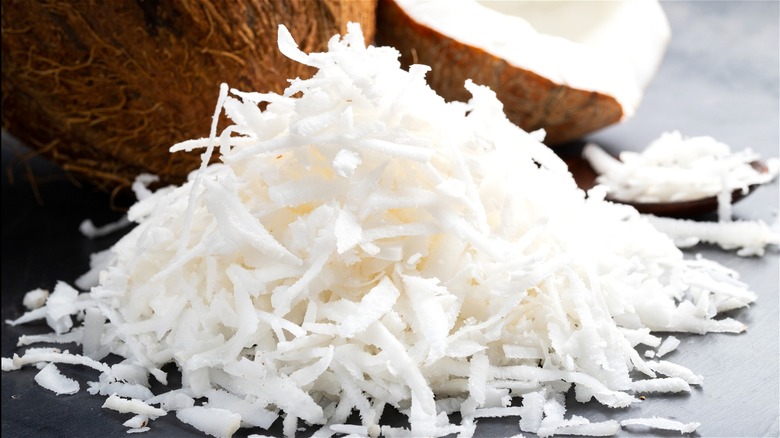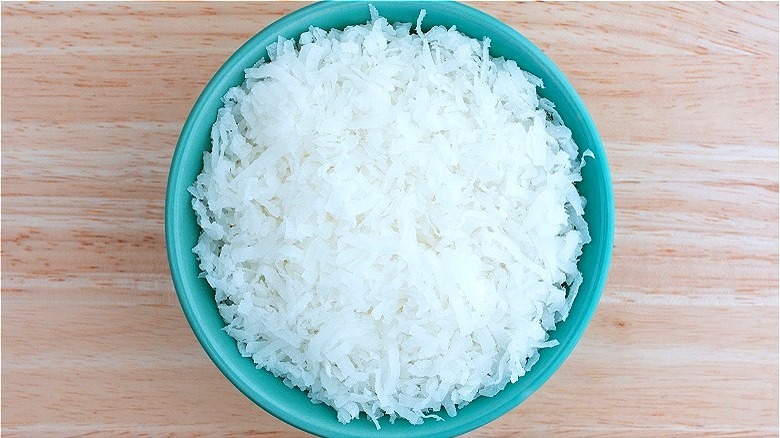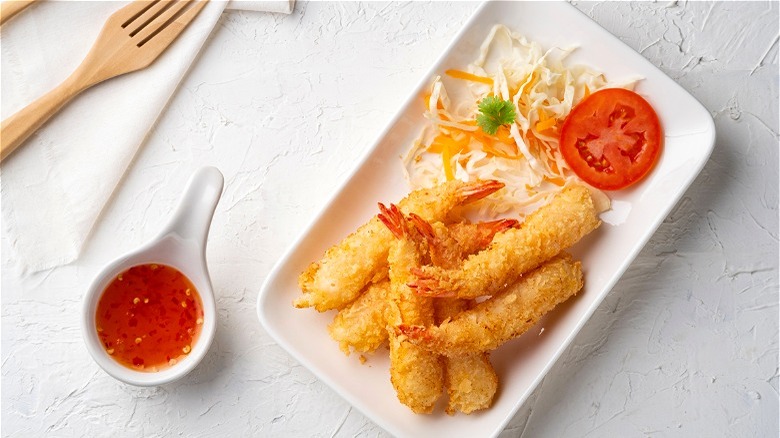Sweetened Vs. Unsweetened Shredded Coconut: Which Is The Better Buy?
If you're a person who likes variety in meal toppings or enjoys extra flavorful desserts, you may have a bag or two of shredded coconut tucked away in your kitchen pantry. Over the last few years, coconuts have only grown in popularity, so using a spoonful or two of shredded coconut on your smoothie bowl or plate of Indian curry has become much more common among American foodies. Mordor Intelligence claims the rise of coconut products — including oil, cream, and snack-based products — can largely be attributed to consumers' growing adoption of plant-based diets and healthier food choices.
Regardless of why you might be opting for more coconut in your life, there is no denying the fact that coconuts are, in fact, a healthy food. According to Healthline, this creamy white fruit is rich in healthy fat, fiber, and various vitamins and minerals such as manganese, copper, and iron. It's even thought to promote blood sugar control. Yet, with so many packaged coconut options, deciding which type of coconut to buy can be a loaded decision. Before we get into the reasons for choosing one type of coconut over the other, let's first unpack the general differences between dried coconut products.
How do packaged coconut varieties differ?
By now most of us know coconut oil falls into the acclaimed pool of healthy cooking oils, but information regarding packaged coconut can often be a little more difficult to figure out. Desiccated coconut is finely grated while shredded and flaked coconut tend to have a little more structure. In the most basic sense, sweetened coconut is dried coconut soaked in a sugar-based solution which often makes sweetened coconut chewy and moist. Shredded unsweetened coconut typically contains no added ingredients and is truly dry in nature. When comparing examples from either side of the spectrum, Baker's sweetened coconut contains coconut, sugar, water and a few preservatives to maintain the coconut's white color and moist composition. On the other hand, shredded unsweetened coconut from Bob's Red Mill contains only one ingredient: unsulphured coconut.
According to Healthfully, while unsweetened coconut may pack a more considerable punch in the fat department, one serving of unsweetened coconut has more fiber and significantly fewer carbohydrates from sugar than its sweetened counterpart. One other notable difference lies in the varieties' toasting capabilities. Sweetened coconut tends to toast much faster than unsweetened coconut – added moisture cooks off and the damp sugar solution begins to break down and caramelize quickly. Now that you know the general differences between shredded coconut varieties, which option is a better buy: sweetened or unsweetened coconut?
Unsweetened coconut's versatility
When it comes down to picking one coconut product for your culinary adventures, you need to consider how much use each variety will get on a regular basis. If we're strictly talking cost, you can buy two, 7-ounce bags of Baker's sweetened coconut on Amazon for under $10, while you can buy a 16-ounce bag of generic unsweetened shredded coconut for the same price.
Since cost likely won't play a huge factor in your decision-making, consider the variability of each. Sweetened coconut is often relegated to sweeter recipes like Ina Garten's coconut macaroons: the Food Network recipe partially relies on moist coconut to help maintain the treat's structure. Unsweetened coconut has a multitude of uses that extend far beyond the realm of desserts. You can sprinkle unsweetened shreds atop any salad or warm soup or even use them as a breading replacement for your favorite coconut shrimp recipe.
If you still want that one-of-a-kind texture you only get when you buy pre-moistened sweet coconut, the good news is you can have the best of both worlds and make a sweet version right at home. All you really need is unsweetened coconut, sugar, and water to make sweetened coconut without the added preservatives, though some recipes add a bit of canola oil for added moisture and better integration of the sugar. Even if you only make cakes, cookies, and pies, having the option to adjust the sweetness of your recipes is often appreciated so unsweetened coconut may see more regular use in your kitchen.


